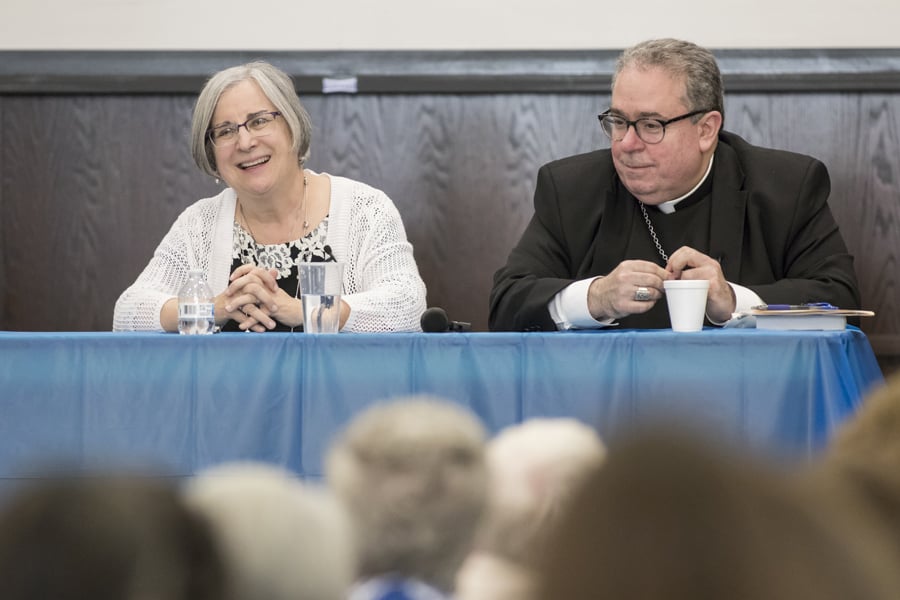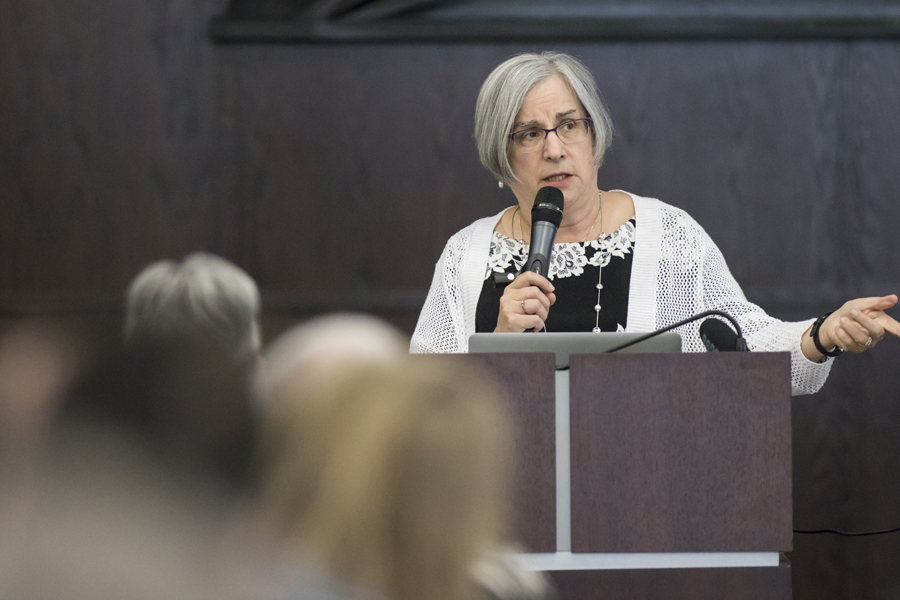Fertile ground: Diocese digs deep into Humanae Vitae at its 50th anniversary

Dr. Janet Smith and Bishop Michael Olson answer questions about marriage, family life, and the encyclical Humanae Vitae during a question-and-answer session on April 2 at the St. Patrick Cathedral Parish Hall. (NTC photo/Juan Guajardo)
FORT WORTH — Gracie Morris did not feel tired as Bishop Michael Olson and Dr. Janet Smith spoke about Humanae Vitae for five hours. The 17-year-old from St. Mary the Virgin Parish in attended the April 28 conference after getting home from her school prom in the wee hours that morning. And the night before, she’d been up late studying.
Morris and 19 other youth from the Arlington church attended the conference on Blessed Pope Paul VI’s encyclical that addresses the perils of artificial contraception. They read Humanae Vitae (Of Human Life) along with Pope Pius XI’s encyclical Casti Connubii (On Christian Marriage) this year in religious education class.
Morris said, “I’m glad I came — it was good teaching. We just studied the morality of artificial contraception in class, and it was interesting to see the scientific side. It [artificial contraception] is just so against what God has made.”
Dr. Janet Smith, a professor of life ethics at Sacred Heart Major Seminary in Detroit, gave two talks at the Humanae Vitae conference hosted at St. Patrick Cathedral's Parish Hall. Her first talk explored the background and history of Blessed Paul VI’s landmark document.
The years preceding the release of the encyclical in 1968 were marked with great cultural, social, and political upheaval, from demonstrations against the Vietnam War to the FDA’s approval of the birth control pill for contraceptive use.
Although some hoped the Catholic Church would change with the times and permit the use of artificial contraception as Protestant denominations had, the document released was consistent with the Church’s unbroken tradition of valuing life and procreation.
In Humanae Vitae, Blessed Paul VI predicted many negative consequences would result if the unitive and procreative aspects of sex were separated by the use of artificial contraception. He anticipated increases in divorce, abortion, adultery, pregnancies to single women, and pornography. He projected a “general lowering of morality.” He foresaw that men would lose respect for women “to the point of considering her as a mere instrument of selfish enjoyment.” He also forecast that government might regulate and sometimes mandate contraception, intervening in the most personal relationship between a man and woman.

Fifty years after its release, many people call the encyclical “prophetic.”
Authoritative Teaching
Bishop Olson stated that Humanae Vitae is a “key document” historically and pastorally, and it laid the groundwork for St. John Paul II’s strong encyclicals affirming the dignity and integrity of the human person.
“One of the things that was very much at stake that required Pope Paul to address it so importantly and so critically was the integrity of family life, the integrity of motherhood, the integrity of paternity, the integrity of the vocation of marriage,” said the prelate.
According to the bishop, the encyclical exhibited the teaching authority of the Church. Today in our postmodern society, people form opinions based on fragmented information from the internet or social media.
“We have a responsibility to do our best to teach as a Church in a way people can hear and understand to the extent that is possible. One of the most important things is the authentic proclamation of the faith, the authentic proclamation of right reason,” he said.
Contraception, Why Not?
Having written and edited several books and articles on Humanae Vitae, Dr. Smith is regarded as a leading expert on the encyclical. In fact, she told the audience of more than 200 that she is speaking at 24 conferences that observe its half-century anniversary this year.

Dr. Janet Smith leads a talk on the history and background of Humanae Vitae, which turns 50 years old this summer. (NTC photo/Juan Guajardo)
More than two million copies of her talk “Contraception, Why Not?” have been distributed, and she delivered that message at the conference. After detailing how artificial contraception diminishes mental and physical health, impedes the selection of a good spouse, and increases the likelihood of divorce, the professor explained cultural fallacies about sexual freedom.
She said, “The biggest lie of all — that sex is just sex, it’s just a powerful physical pleasure. . . . Sex changes your life. A baby changes your life forever, so you are engaging in an act that can change your life forever. Sex is not trivial. . . . Sex is for making love and making families, not just for pleasure.”
According to Dr. Smith, artificial contraception sends the message that “I want a momentary pleasure with you” instead of “I am willing to be a parent with you. I am here for you forever.” Our culture does not recognize the sacredness of sex, which invites God to create a new, eternal human soul.
The conference, co-sponsored by Mother and Unborn Baby Care and WholeLife Authentic Care, concluded with a question-and-answer session and recommended resources, which included usccb.org and fwdioc.org.
“How do you defend the Church teaching on marriage?” queried one attendee. Dr. Smith suggested asking questioners to read Church teaching in front of the Blessed Sacrament. “We don’t have anything to apologize for,” she asserted. “We have the confidence that this is the truth.”
